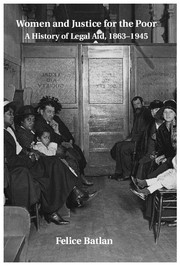I've been really looking forward to this new release, from Cambridge University Press:
Women and Justice for the Poor: A History of Legal Aid, 1863–1945, by former guest blogger Felice Batlan (Illinois Institute of Technology/Chicago-Kent College of Law). Here's the abstract:
This book re-examines fundamental assumptions about the
American legal profession and the boundaries between “professional”
lawyers, “lay” lawyers, and social workers. Putting legal history and
women's history in dialogue, it demonstrates that nineteenth-century
women's organizations first offered legal aid to the poor and that
middle-class women functioning as lay lawyers, provided such assistance.
Felice Batlan illustrates that by the early twentieth century, male
lawyers founded their own legal aid societies. These new legal aid
lawyers created an imagined history of legal aid and a blueprint for its
future in which women played no role and their accomplishments were
intentionally omitted. In response, women social workers offered harsh
criticisms of legal aid leaders and developed a more robust social work
model of legal aid. These different models produced conflicting
understandings of expertise, professionalism, the rule of law, and
ultimately, the meaning of justice for the poor.
Reviewers say:
"Women and Justice for the Poor is an exciting and timely
intervention into work on lawyering in the United States. Batlan
establishes the deep relevance of ideas about gender and race to the
history of law and legal practice through ambitious research,
provocative analysis, and engaging narrative."
-- Martha S. Jones, Arthur F. Thurnau Professor, University of Michigan
"By
tracking legal aid through the winding corridors of urban social
institutions, Batlan gives us evocative insights into gender, reform,
capitalism, and lawyering in a cogent and fascinating historical
account. Her erosion of lay and professional boundaries, demonstrated by
women’s contribution to legal aid and the pragmatic relief they
provided to underprivileged clients, illuminates the value of using
gender to frame the story."
-- Norma Basch, Professor Emeritus, Rutgers University
"In a
remarkably original social/legal history, Batlan is asking readers to
rethink what lawyering has meant and could mean. And when you ask
‘outside the box’ questions, you come up with surprising answers. This
book can help us understand why law today can be far from justice."
-- Linda Gordon, Florence Kelley Professor of History, New York University
More information is available
here.
